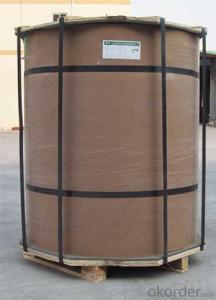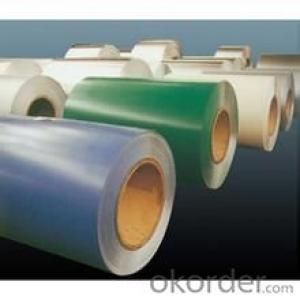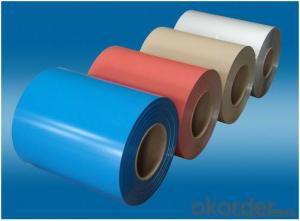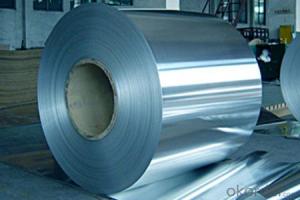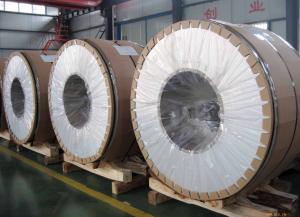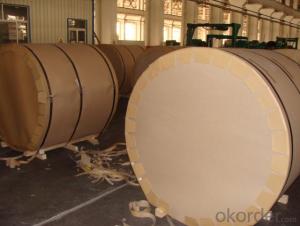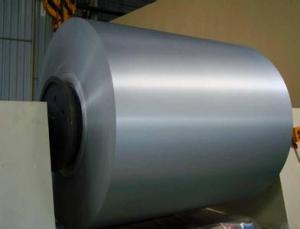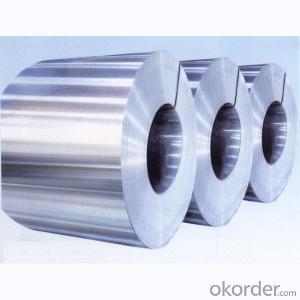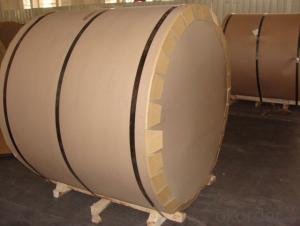Customized 1050 Aluminum Coil - AA3XXX Aluminum Coils Mill-Finished for Construction
- Loading Port:
- Shanghai
- Payment Terms:
- TT OR LC
- Min Order Qty:
- 3 m.t.
- Supply Capability:
- 10000 m.t./month
OKorder Service Pledge
OKorder Financial Service
You Might Also Like
Specification
1.Structure of AA3xxx Aluminum Coils Mill-Finished Used for Construction Description
AA3xxx Aluminum Coils Mill-Finished Used for Construction is one semi-finished aluminium material. This strip can be rolled down to aluminium foil.The final thickess can be 5-20 microns. Aluminium foil is soft, ductile and with a silver-white luster which can be widely used in a large scare of fields.
2.Main Features of AA3xxx Aluminum Coils Mill-Finished Used for Construction
1)Resistant to weather corrosion ,durability, formability, self Cleansing
2)good quality
3)competitive price
4)short delivery time
5)long mutual beneficial business cooperation
3.AA3xxx Aluminum Coils Mill-Finished Used for Construction Images
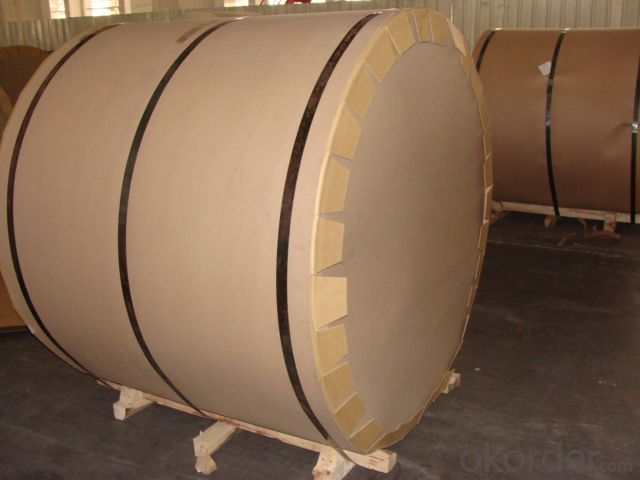
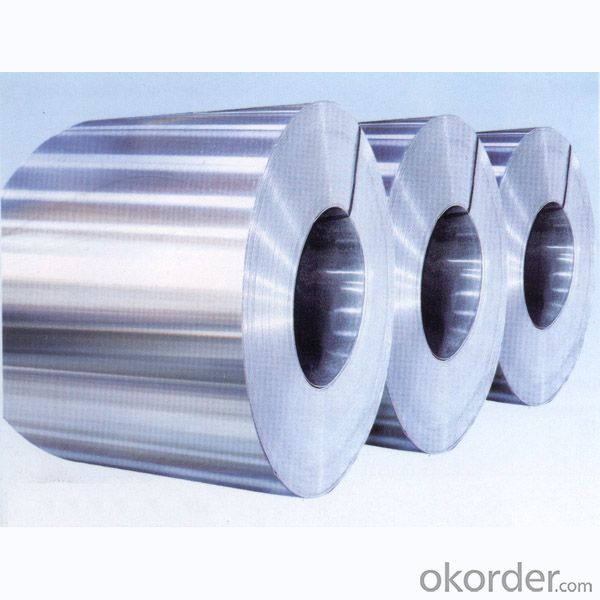
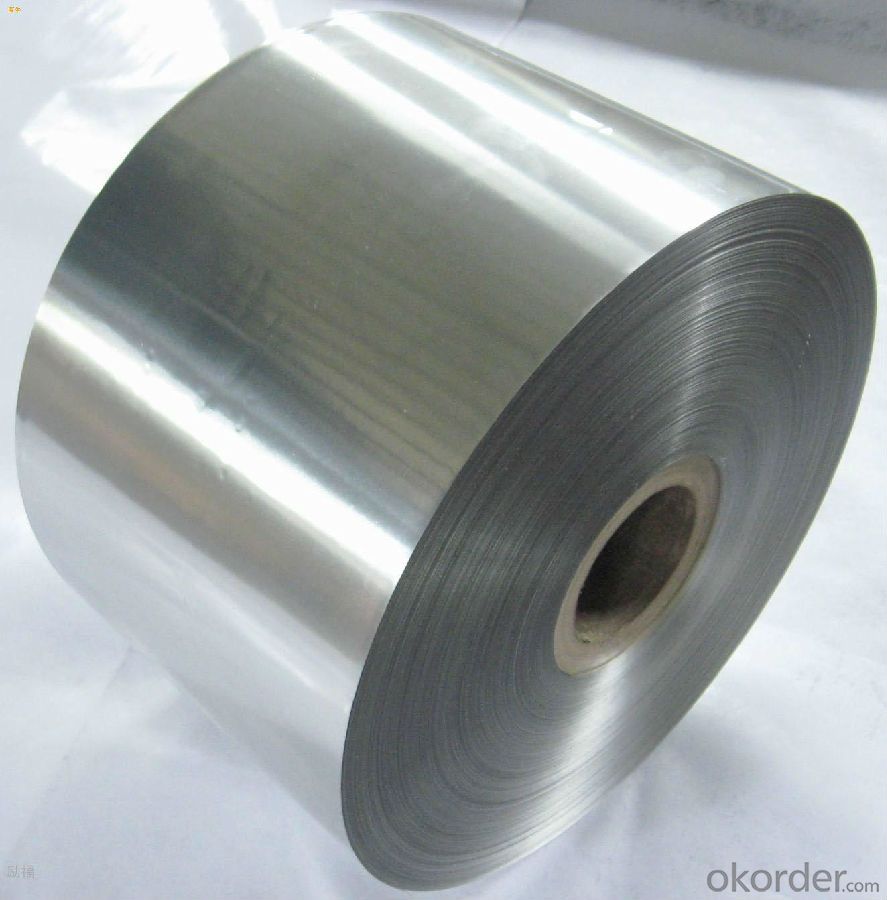
4.AA3xxx Aluminum Coils Mill-Finished Used for Construction Specification
Alloy | AA3xxx |
Temper | H14, H16, H18, H22, H24, H26, H32, O/F |
Thickness | 0.2mm -- 100mm |
Width | 30mm -- 1700mm |
Standard | GB/T 3880-2006,EN,ASTM,JIS |
5. FAQ of AA3xxx Aluminum Coils Mill-Finished Used for Construction
What is the quality standard?
---Usually our standard is GB3880-2006
What is the largest width?
---It is 2300mm
How to guarantee the quality?
---Customers are welcome to our mill to visit and check the products.
- Q: Are aluminum coils resistant to abrasion?
- Yes, aluminum coils are generally resistant to abrasion. Aluminum is known for its durability and ability to withstand wear and tear. It has a high strength-to-weight ratio and excellent corrosion resistance properties, making it suitable for various applications where abrasion resistance is required. Additionally, aluminum coils are often coated or treated with protective finishes, further enhancing their resistance to abrasion. However, the specific level of resistance may vary depending on the specific alloy and the surface treatment applied to the coils.
- Q: Pretty please can someone show me the steps on how to do this one?Calculate the mass in grams of iodine (I2) that will react completely with 43.7 g of aluminum (Al) to form aluminum iodide
- easily the guy earlier me did it precise yet made a mistake at one ingredient 0.07 mole is the # of moles of Al which desires to get replaced to moles of product, and then returned to come across mole of iodide. as quickly as thats stumbled on then you quite can use the MW to alter it to grams.
- Q: Can aluminum coils be used in low-friction applications?
- Yes, aluminum coils can be used in low-friction applications. Aluminum is a lightweight and corrosion-resistant material that has excellent thermal conductivity. These properties make it suitable for various applications where low-friction is desired. In industries such as automotive, aerospace, and HVAC systems, aluminum coils are often used in heat exchangers, evaporators, condensers, and cooling coils. These coils are designed to efficiently transfer heat, while minimizing friction and energy loss. Additionally, aluminum coils can be used in electrical motors, generators, and transformers, where low friction is essential for smooth operation and reduced energy consumption. The lightweight nature of aluminum also helps to reduce the overall weight of the system, leading to improved efficiency. Furthermore, aluminum coils can be utilized in various types of machinery and equipment that require low friction, such as conveyor systems, sliding mechanisms, and bearings. Aluminum's low coefficient of friction allows for smooth and efficient movement, minimizing wear and tear on the components. Overall, aluminum coils are a versatile solution for low-friction applications due to their lightweight, corrosion-resistant, and thermally conductive properties. Their use can lead to improved energy efficiency, reduced maintenance costs, and enhanced performance in a wide range of industries.
- Q: The question asks if magnetic induction can be used to inspect the quality of an aluminum coil.
- <p>No, you cannot use magnetic induction to inspect the quality of an aluminum coil. Magnetic induction is a method used to detect flaws or discontinuities in ferromagnetic materials, such as steel, by inducing eddy currents. Aluminum is not a ferromagnetic material, so it does not retain magnetism or support the formation of eddy currents in the same way. Instead, other non-destructive testing methods like ultrasonic testing or radiographic testing may be more appropriate for inspecting the quality of aluminum coils.</p>
- Q: How do aluminum coils contribute to architectural design flexibility?
- Aluminum coils contribute significantly to architectural design flexibility due to their unique properties and versatility. Firstly, aluminum coils are lightweight, which makes them easier to handle and install compared to other materials like steel or concrete. This characteristic allows architects to explore more creative and innovative designs without worrying about the weight limitations. It also enables the construction of large and complex structures, providing architects with greater freedom in their designs. Secondly, aluminum coils offer a wide range of surface finishes and colors. They can be painted, anodized, or coated with various materials, allowing architects to achieve desired aesthetic effects and match the building's appearance with its surroundings or the intended architectural style. This wide range of finishes enables architects to experiment with different visual effects, textures, and patterns, thereby enhancing the overall design flexibility. Furthermore, aluminum coils possess excellent corrosion resistance properties. This durability ensures that the architectural elements made from aluminum coils can withstand harsh weather conditions, such as rain, snow, or UV radiation, without deteriorating over time. This enhanced lifespan and low maintenance requirement make aluminum coils an attractive choice for architects seeking long-lasting and sustainable design solutions. Additionally, aluminum coils can be easily formed, bent, or shaped into various profiles and dimensions. This malleability allows architects to create customized architectural elements that fit specific design requirements, such as curved facades, intricate detailing, or irregular shapes. The ability to shape aluminum coils according to the architects' vision enables the realization of unique and distinctive designs that stand out in the architectural landscape. Lastly, aluminum coils are recyclable and environmentally friendly. The use of aluminum in architectural design aligns with sustainable practices, as it can be recycled repeatedly without losing its properties. This aspect appeals to architects and clients who prioritize eco-friendly design solutions and wish to reduce their carbon footprint. In conclusion, aluminum coils contribute significantly to architectural design flexibility by offering lightweight construction, a wide range of surface finishes, excellent corrosion resistance, malleability, and recyclability. These characteristics empower architects to push the boundaries of design, create visually stunning structures, and deliver sustainable and long-lasting architectural solutions.
- Q: Can aluminum coils be used in aerospace applications?
- Indeed, aerospace applications do make use of aluminum coils. The aerospace industry extensively utilizes aluminum due to its lightweight nature and impressive strength-to-weight ratio. Aircraft structures, including fuselages, wings, and landing gear, often incorporate aluminum coils. Moreover, heat transfer and cooling systems also benefit from their presence. The exceptional corrosion resistance and high thermal conductivity of aluminum coils render them fitting for diverse aerospace purposes. Furthermore, their malleability and ease of fabrication enable the creation of intricate shapes and designs necessary for aerospace components.
- Q: What is the reason for the grooves that go around the circumference of a tin/aluminium can? It can't be for grip because they're covered with paper anyway and i don't think it would make much difference.
- Strength.
- Q: what properties etc makes us use aluminium as the material behind cans...And why does it have the properties?
- For soda cans, it's relatively inert, flexible enough to handle a carbonated liquid, and can be opened without tools. For food, zinc-coated iron or steel is more common. The field that helps you understand why materials have the properties they have is called physical chemistry.
- Q: How do aluminum coils compare to other metal coils in terms of cost?
- Aluminum coils are generally more cost-effective compared to other metal coils due to the lower cost of aluminum as a raw material and its abundance in nature. Additionally, aluminum coils offer superior corrosion resistance, lightweight properties, and energy efficiency, making them a cost-efficient choice in various applications.
- Q: Does anyone know of any men's deodorant that doesn't contain aluminum? It has to be strong, as I do sweat a lot.
- Go to old spice there the best
Send your message to us
Customized 1050 Aluminum Coil - AA3XXX Aluminum Coils Mill-Finished for Construction
- Loading Port:
- Shanghai
- Payment Terms:
- TT OR LC
- Min Order Qty:
- 3 m.t.
- Supply Capability:
- 10000 m.t./month
OKorder Service Pledge
OKorder Financial Service
Similar products
Hot products
Hot Searches
Related keywords
